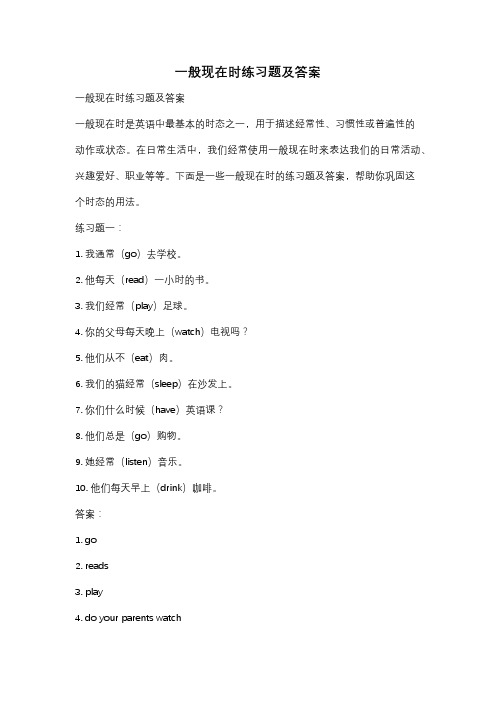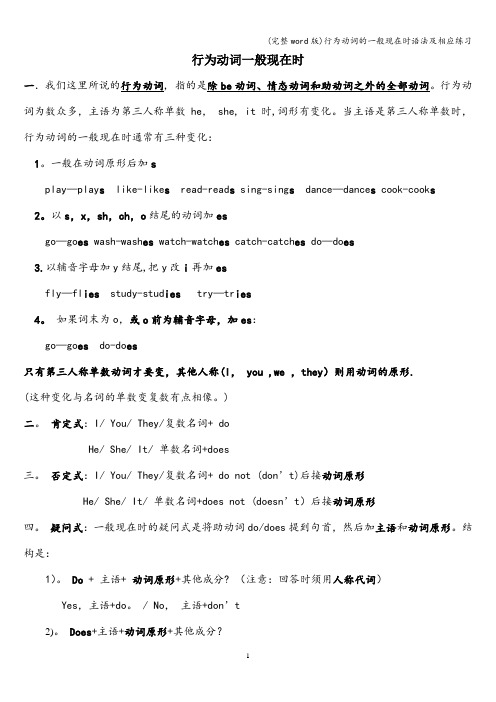行为动词的一般现在时及相应练习
一般现在时的练习题加答案

一般现在时的练习题加答案一般现在时是描述经常发生的动作或事实的基本时态。
在使用一般现在时时,需要注意动词的变形规则,主要有以下几点:1. 动词第三人称单数形式:当主语是第三人称单数(he、she、it)时,动词要加上-s或-es。
例如:- I study English every day.(我每天学习英语。
)- He studies English every day.(他每天学习英语。
)2. 动词的基本形式:当主语不是第三人称单数时,动词使用基本形式。
例如:- They play basketball every weekend.(他们每个周末打篮球。
)- We go to the park every Sunday.(我们每个星期天去公园。
)以下是一些关于一般现在时的练习题及参考答案:练习题1:完成下列句子,使用适当的动词形式。
1. My sister __________ (watch) TV in the evening.2. They __________ (play) soccer after school.3. Jack and Lisa __________ (do) their homework every day.4. The sun __________ (rise) in the east.5. We __________ (drink) coffee every morning.参考答案1:1. My sister watches TV in the evening.2. They play soccer after school.3. Jack and Lisa do their homework every day.4. The sun rises in the east.5. We drink coffee every morning.练习题2:选择适当的动词形式填空。
一般现在时练习题及答案

一般现在时练习题及答案一般现在时练习题及答案一般现在时是英语中最基本的时态之一,用于描述经常性、习惯性或普遍性的动作或状态。
在日常生活中,我们经常使用一般现在时来表达我们的日常活动、兴趣爱好、职业等等。
下面是一些一般现在时的练习题及答案,帮助你巩固这个时态的用法。
练习题一:1. 我通常(go)去学校。
2. 他每天(read)一小时的书。
3. 我们经常(play)足球。
4. 你的父母每天晚上(watch)电视吗?5. 他们从不(eat)肉。
6. 我们的猫经常(sleep)在沙发上。
7. 你们什么时候(have)英语课?8. 他们总是(go)购物。
9. 她经常(listen)音乐。
10. 他们每天早上(drink)咖啡。
答案:1. go2. reads3. play4. do your parents watch5. eat6. sleeps7. do you have8. go9. listens to10. do they drink练习题二:1. 你通常几点起床?2. 他们每周末去哪里?3. 你的朋友们喜欢什么运动?4. 你们的狗喜欢吃什么食物?5. 他们多久去一次健身房?6. 你们的邻居是干什么的?7. 你每天晚上做什么?8. 他们有多少个孩子?9. 你喜欢什么颜色?10. 他们通常什么时候吃晚饭?答案:1. What time do you usually get up?2. Where do they go on weekends?3. What sports do your friends like?4. What food does your dog like?5. How often do they go to the gym?6. What do your neighbors do?7. What do you do every evening?8. How many children do they have?9. What color do you like?10. When do they usually have dinner? 练习题三:1. 我们经常(go)购物。
(完整word版)行为动词的一般现在时语法及相应练习

行为动词一般现在时一.我们这里所说的行为动词, 指的是除be动词、情态动词和助动词之外的全部动词。
行为动词为数众多,主语为第三人称单数he, she, it时,词形有变化。
当主语是第三人称单数时,行为动词的一般现在时通常有三种变化:1。
一般在动词原形后加splay—play s like-like s read-read s sing-sing s dance—dance s cook-cook s2。
以s,x,sh,ch,o结尾的动词加esgo—go es wash-wash es watch-watch es catch-catch es do—do es3.以辅音字母加y结尾,把y改i再加esfly—fl ies study-stud ies try—tr ies4。
如果词末为o,或o前为辅音字母,加es:go—go es do-do es只有第三人称单数动词才要变,其他人称(I, you ,we ,they)则用动词的原形.(这种变化与名词的单数变复数有点相像。
)二。
肯定式:I/ You/ They/复数名词+ doHe/ She/ It/ 单数名词+does三。
否定式:I/ You/ They/复数名词+ do not (don’t)后接动词原形He/ She/ It/ 单数名词+does not (doesn’t)后接动词原形四。
疑问式:一般现在时的疑问式是将助动词do/does提到句首,然后加主语和动词原形。
结构是:1)。
Do + 主语+ 动词原形+其他成分? (注意:回答时须用人称代词)Yes,主语+do。
/ No,主语+don’t2)。
Does+主语+动词原形+其他成分?Yes,主语+does。
/ No, 主语+doesn’t.(注意:回答时须用人称代词)五. 那么,什么情况下用行为动词的一般现在时呢?当这个动作经常发生或表示习惯性的动作时,通常用一般现在时,它经常与表示频度的时间状语连用,如,当句子中有every day every year ,on Sunday, in the morning ,often, sometimes,usually, at one o’clock等词时,用一般现在时。
一般现在时

练习
翻译句子: 1.我们周日去公园。
We go to the park on Sunday.
2.我不是很喜欢英语。
3.他们每年都来中国。
I don't like English very much.
4。他们不是每年都来中国。
They come to China every year.
They don't come to China every year.
• 4.Tom ___his homework at home. A don't do B doesn't C doesn't do D don't 5. My father ____computer games. A sometimes play B plays sometimes C sometime play D sometimes plays 6. His grandpa likes the film and often___to the cinema. A go B goes C is going D to go 7. Do you ___have parties? -Yes.Every Saturday evening. A does B never C often D do
一般现在时的特殊疑问句(3) • How do I write my homework on the y name? • When does he use a computer? • 构成:特殊疑问词+一般疑问句语序
练习
1.你每年寄多少张明信片? How many postcards do you send every year?
• 三.单数第三人称行为动词一般现在时 的疑问形式是在句首加助动词does, 后面的谓语动词要用原形。 • 比较: • 肯定句:He gets up very early. • 疑问句:Does he get up very early? • 答语 :Yes,he does. • NO,he doesn't.
一般现在时(第三人称单数形式_)及练习

一般现在时(第三人称单数形式_)及练习一般现在时(第三人称单数形式)Hello, boys and girls.我是一般现在时,你们想知道我的故事吗Let me tell you!首先,介绍我的本领。
我的本领有三样:1.表示事物或人物的特征、状态。
如:The sky is blue.天空是蓝色的。
2.表示经常性或习惯性的动作。
如:I get up at six every day.我每天六点起床。
3.表示客观现实。
如:The earth goes around the sun.地球绕着太阳转。
第二,请看我的面目--构成:1. be动词:主语+be(am ,is ,are)+其它。
如:I am a boy.我是一个男孩。
2.行为动词:主语+行为动词(+其它)。
如:We study English.我们学习英语。
当主语为第三人称单数(he, she ,it)时,三单变化:1.多数在动词后加s,play—plays like—likes2.以s,x,sh,ch,o结尾的动词加es go—goes wash—washes 3.4.以辅音字母加y结尾,把y改i再加es,fly—flies。
元音字母加y结尾的,直接加s,play-plays。
5.特殊:have-has第三,我的变化--否定句、一般疑问句、特殊疑问句:1.be动词的变化。
否定句:主语+ be + not +其它。
如:He is not a worker.他不是工人。
一般疑问句:Be +主语+其它。
如:-Are you a student -Yes. I am. / No, I'm not.特殊疑问句:疑问词+一般疑问句。
如:Where is my bike2.行为动词的变化。
否定句:主语+ don't( doesn't ) +动词原形(+其它)。
如:I don't like bread.当主语为第三人称单数时,要用doesn't构成否定句。
行为动词的一般现在时练习题

行为动词的一般现在时练习题LEKIBM standardization office【IBM5AB- LEKIBMK08- LEKIBM2C】行为动词的一般现在时态的学习一.行为动词:除be动词、情态动词、助动词以外的动词,也叫实义动词。
二.概念:一般现在时表示经常发生的动作或存在的状态。
三.常与always、often、usually、sometimes、every day、in the morning、on Sundays等时间状语连用。
如:We go to school every day.He often does his homework in the evening.China is a big country.四.用法:1)表示经常性的动作 2)表示客观真理、客观存在、科学事实 3)表示格言或警句4)表示现在时刻的状态、能力、性格、个性 5)在时间和条件状语从句中代表一般将来时。
五.构成:一般现在时主要用动词原形,如果主语是第三人称单数动词变三单,具体规则如下:1.直接在词尾加s,如:play– play s2.词尾是o,s,x,sh,ch的,直接加es,如: pass--passes wash--washes fix--fixes watch—watches3.以辅音加y结尾的,把y变为i,再加es,如:study—studies4.不规则变化的:have--has 六.难点:当句子主语是第三人称单数时,谓语动词要用第三人称单数形式。
七.句型转换:1.否定句:在行为动词的前面加don’t或doesn’t(does not),注意谓语动词要还原为动词原形。
( 1 )I play basketball on Wednesday..I don’t play basketball on Wednesday.( 2 )Lily has breakfast every day.Lily doesn’t have breakfast every day.2.一般疑问句:在句首加助动词do或does,后面的谓语动词还原为动词原形.3.肯定与否定回答:Yes, 主+ do/does./ No, 主+ do/doesn’t.Does he have breakfast every dayYes, he does./ No, he doesn’t.行为动词的一般现在时练习题一、写出下列动词的第三人称单数1、clean_____2、read_____3、make ___4、look ____5、 play___6、pass____7、wash____8、fix_______9、watch_____10、do_______11、fly二、写出下列动词的正确形式:1、I (go) to school at seven in the morning.2. Mike ( do) his homework at eight in the evening.3. His father often ( read) books in the library onSaturday.mother usually (watch) TV plays at home.5. My cousin sometimes (play ) cards with me.6. you often (study ) after schoolYes , I do.7. Mike and Tom usually (fly ) kites on Sunday.8. They (go) to school by bus every day.9. She (go ) to school by bus every day.usually (listen ) to the radio in the morning.11. He usually (listen ) to the radio in the morning.12. he usually (listen ) to the music at home?---No, he .三、用括号内动词适当的形式填空often_________(play) in the playground.2.He often________ (get) up at six o’clock.3._____you___ (brush) your teeth every morning.4. What___(do) he usually____(do) after school?5. ________ they ____________(like) the World Cup?6.Mike sometimes __________(go) to the park with his sister.7.At eight at night, she_ (watch) TV with his parents. 8_____ Mike_____ (read) English every day?9.How many lessons_your classmate________(have) on Monday?10.What time_his mother(do) the housework?11. He often ________(have) dinner at home.12. Daniel and Tommy _______(be) in Class One.. 1313. We _______(not watch) TV on Monday.14. Nick _______(not go) to the zoo on Sunday.15. ______ they ________(like) the World Cup?四、句型转换。
小学英语语法时态归纳及练习(含答案解析)

英语时态归纳一、一般现在时:标志词:often(经常) sometimes(有时) always(总是) usually(通常) never(从不) every(每一)行为动词词型变化形式:一般现在时动词只有第三人称有词形变化;其他人称(第一人称:I, we;第二人称:you;第三人称复数:they、my friends)动词均用原形。
当主语是第三人称单数时,一般动词在一般现在时句子中的变化规律:1、多数在动词后加s:play—plays like—likes ,2、以s,x,sh,ch,o结尾的动词加es wash–washes catch–catches do–does3、以辅音字母加y结尾,把y改i再加es fly—flies study—studies4、以元音字母加y结尾,直接加s buy – buys5、不规则变化have—has一般现在时基本用法功能1.表示事物或人物的特征、状态。
如:The sky is blue.天空是蓝色的。
2.表示经常性或习惯性的动作。
如:I get up at six every day.我每天六点起床。
3.表示客观现实。
如:The earth goes around the sun.地球绕着太阳转。
The earth is round.构成1. be动词:主语+be(am,is,are)+其它。
如:I am a boy.我是一个男孩。
2.行为动词:主语+行为动词(+其它)。
如:We study English.我们学习英语。
句型肯定句:A.be动词:主语+ be + 其它成分He is a worker.B.行为动词:主语+动词(注意人称变化) +其它成分We like the little cat.否定句:A.be动词:主语+ be + not+其它成分They are not students.B.行为动词:主语+助动词(do/does) + not+动词原形+其它成分We don’t like the little cat.一般疑问句:A.be动词:Am / Is /Are +主语+ 其它成分Are you a teacher? Yes, I am. / No, I am not.Are they students of your school. Yes, they are / No they aren’t.B.行为动词:助动词(Do/Does)+主语+动词原形+ 其它成分Do you like it? Yes, I do. / No. I don’t .Does he(she) like it? Yes, he( she )does. / No, he ( she )doesn’t.特殊疑问句:疑问词+ 一般疑问句A.be动词:How many students are there in your school?B.行为动词:What do you usually do on Sunday?一般现在时动词be和have的变化形式1.动词Be 叫连系动词, 用法:第一人称单数用am,第三人称单数用is,其它人称用are。
一般现在时的专项训练及答案

一般现在时的专项训练及答案一般现在时是英语语法中最基础、最常用的时态之一,它用来表示习惯性的行为、事实或真理。
在日常生活中,我们经常会运用到一般现在时,因此对于学习英语的人来说,掌握一般现在时是非常重要的。
为了帮助大家更好地掌握一般现在时,下面将提供一些专项训练及答案,希望能对大家的学习有所帮助。
专项训练练习一:写出下列动词的第三人称单数形式1.go2.study3.play4.eat5.watch6.have7.do8.run答案1.goes2.studies3.plays4.eats5.watches6.has7.does8.runs练习二:填空1.She ___ (work) in a bank.2.They ___ (read) books every day.3.He often ___ (go) to the gym.4.My mother ___ (cook) delicious meals.5.The sun ___ (rise) in the east.答案1.works2.read3.goes4.cooks5.rises练习三:改为一般现在时1.She is reading a book.2.They are playing football.3.He is cooking dinner.4.I am going to the park.5.The train is arriving at 9 p.m.答案1.She reads a book.2.They play football.3.He cooks dinner.4.I go to the park.5.The train arrives at 9 p.m.结语通过以上的专项训练,相信大家对一般现在时有了更深入的理解。
在学习语法的过程中,多做练习是非常重要的,希望大家能够坚持下去,不断提升自己的英语水平。
如果还有不明白的地方,可以随时向老师请教或寻求帮助,共同进步!。
- 1、下载文档前请自行甄别文档内容的完整性,平台不提供额外的编辑、内容补充、找答案等附加服务。
- 2、"仅部分预览"的文档,不可在线预览部分如存在完整性等问题,可反馈申请退款(可完整预览的文档不适用该条件!)。
- 3、如文档侵犯您的权益,请联系客服反馈,我们会尽快为您处理(人工客服工作时间:9:00-18:30)。
行为动词一般现在时的变化
我们这里所说的行为动词,指的是除be动词、情态动词和助动词之外的全部动词。
行为动词为数众多,主语为第三人称单数he, she, it 时,词形有变化。
当主语是第三人称单数时,行为动词的一般现在时通常有三种变化:
1、多数在动词后加s
play—play s like—like s read-read s sing-sing s dance-dance s cook- cook s look- look s
2、以s,x,sh,ch,o结尾的动词加es
go—go es wash—wash es watch-watch es catch-catch es
do- do es
3、以辅音字母加y结尾,把y改i再加es
fly—fl ies study—stud ies try-tr ies
(这种变化与名词的单数变复数有点相像)
那么,什么情况下用行为动词的一般现在时呢?
当这个动作经常发生或表示习惯性的动作时,通常用一般现在时,它经常与表示频度的时间状语连用,如,当句子中有every day every year ,on Sunday, in the morning ,often, sometimes, usually, at one o’clock等词时,用一般现在时。
例句:He get s up at 6 o’clock.
She usually watch es TV in the evening.
Sometimes he go es to school by car.
Tom often fl ies a kite on Sunday.
只有第三人称单数动词才要变,其他人称(I, you ,we ,they)则用动词的原形。
行为动词的一般现在时练习题
班级姓名座号
写出下列动词的正确形式:
1、I (go) to school at seven in the morning.
2. Mike ( do) his homework at eight in the evening.
3. His father often ( read) books in the library on Saturday.
4.My mother usually (watch) TV plays at home.
5. My cousin sometimes (play ) cards with me.
6. you often (study ) after school ?Yes ,
I do.
7. Mike and Tom usually (fly ) kites on Sunday.
8. They (go) to school by bus every day.
9. She (go ) to school by bus every day.
10.We usually (listen ) to the radio in the morning.
11. He usually (listen ) to the radio in the morning.
12. he usually (listen ) to the music at home? No, he .。
